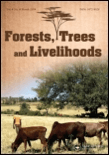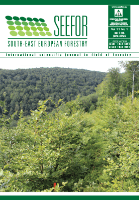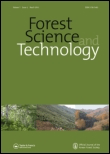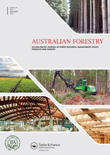
Small-Scale Forestry
Scope & Guideline
Elevating the discourse on biodiversity and sustainability.
Introduction
Aims and Scopes
- Sustainable Management Practices:
The journal emphasizes sustainable forestry management practices that enhance both ecological integrity and economic viability for smallholders. This includes studies on agroforestry, non-timber forest products, and community-based forestry initiatives. - Community Engagement and Governance:
Research on the role of local communities in forest management, including governance structures, stakeholder participation, and the socio-political dynamics that influence forestry practices. - Economic Viability of Smallholder Forestry:
Exploration of economic aspects surrounding small-scale forestry, including market access, value chains for timber and non-timber products, and the financial sustainability of smallholder practices. - Impact of Climate Change:
Investigations into how climate change affects small-scale forestry operations, including adaptive strategies for resilience and the implications for local livelihoods. - Cultural and Social Dimensions of Forestry:
Examination of the cultural significance of forests to local communities, including traditional knowledge, values associated with forest resources, and the social impacts of forestry practices.
Trending and Emerging
- Agroforestry and Integrated Land Use:
There is an increasing focus on agroforestry systems that integrate trees with agricultural practices, emphasizing their role in enhancing biodiversity, improving soil health, and providing economic benefits. - Digital Tools and Technologies:
The emergence of mobile applications and digital platforms for optimizing forestry practices and value chains is gaining traction, reflecting an adaptation to modern technological advancements. - Forest Owner Attitudes and Behavior Change:
Research is increasingly exploring the attitudes and behavioral change of forest owners towards management practices, particularly in relation to environmental sustainability and resource conservation. - Climate Adaptation Strategies:
Studies focusing on adaptive strategies for small-scale forestry in response to climate change are becoming more prominent, emphasizing resilience and sustainability in forestry practices. - Community-based Resource Management:
There's a notable trend towards research on community-based resource management models, showcasing the importance of local governance and collective action in sustainable forestry.
Declining or Waning
- Traditional Forestry Practices:
Research on traditional or indigenous forestry practices appears to be declining, possibly as newer methods and techniques gain traction. There is less emphasis on purely traditional approaches without integration of modern practices. - Large-Scale Industrial Forestry:
The journal has shifted away from topics primarily focused on large-scale industrial forestry practices, reflecting a growing interest in smallholder systems and their unique challenges. - Generalized Economic Analyses:
Broad economic analyses that do not specifically address smallholder contexts or the nuances of small-scale forestry are becoming less common, as the journal emphasizes more targeted studies that provide actionable insights for smallholders.
Similar Journals

Forests Trees and Livelihoods
Exploring the Interconnections of Nature and CommunityForests, Trees and Livelihoods is a distinguished journal published by Taylor & Francis Ltd, focusing on the intricate relationships between forestry, environmental sustainability, and rural livelihoods. With an ISSN of 1472-8028 and an E-ISSN of 2164-3075, this journal has been a pivotal platform since its inception in 1999, converging on contemporary issues through 2024. Ranked in the Q2 quartile of the forestry category, it stands at rank #77 out of 174 in Scopus, evidencing its significance in agricultural and biological sciences. The journal aims to disseminate novel research findings, policy analyses, and case studies that inform sustainable forestry practices and contribute to improving the livelihoods of communities reliant on forest resources. Through its commitment to quality and accessibility, Forests, Trees and Livelihoods is an essential resource for researchers, professionals, and students striving to enhance understanding and practices in the field of forestry.

Forest and Society
Uniting voices for sustainable forest management.Forest and Society is a premier peer-reviewed journal that serves as a significant platform for researchers, practitioners, and policy-makers in the fields of forestry, geography, and social sciences. Published by the Faculty of Forestry at Universitas Hasanuddin in Makassar, Indonesia, this Open Access journal has been committed to disseminating high-quality research since its inception in 2017. With an impressive impact profile, as evidenced by its Q1 quartile ranking in Forestry and Political Science for 2023, Forest and Society effectively connects innovative research with pressing global issues related to forest management and sustainable development. The journal's objectives include fostering interdisciplinary collaboration and driving insightful discussions around conservation practices and socio-political dimensions of forest governance. By providing unhindered access to invaluable resources, Forest and Society aims to empower the academic community and enhance the sustainable stewardship of forest resources.

Jurnal Manajemen Hutan Tropika
Fostering innovation in tropical forest research.Jurnal Manajemen Hutan Tropika, with ISSN 2087-0469 and E-ISSN 2089-2063, is an esteemed academic journal published by the Bogor Agricultural University, Faculty of Forestry in Indonesia. Since its inception in 1999 as an Open Access journal, it has been dedicated to advancing knowledge in the fields of ecology, forestry, and related environmental sciences. Aiming to provide a robust platform for disseminating research, it has achieved notable rankings within Scopus, including a Q3 classification in Ecology and Ecology Evolution, as well as a Q2 ranking in Forestry for 2023. The journal's commitment to open access ensures that vital research findings are readily available to researchers, professionals, and students alike, fostering collaboration and innovation in tropical forest management. Located at KAMPUS IPB DARMAGA, BOGOR, JAWA BARAT, this journal continues to be a significant resource for enhancing sustainable forest practices and contributing to ecological understanding in the region and beyond.

Floresta e Ambiente
Fostering innovation in forestry and environmental science.Floresta e Ambiente is a pioneering open-access journal dedicated to advancing knowledge in forestry and environmental science, published by the Federal Rural University of Rio de Janeiro's Institute of Forests. Since its inception in 2012, this journal has emerged as a crucial platform for researchers, professionals, and students to disseminate innovative findings and foster discussions on sustainable forest management, conservation practices, and the ecological significance of forests in Brazil and beyond. With an impressive impact factor and a commendable ranking in the SCOPUS database, positioned in the 49th percentile of the Agricultural and Biological Sciences category, Floresta e Ambiente actively supports the dissemination of high-quality research while contributing to the global discourse on forestry. As an open access journal since 2013, it ensures that valuable knowledge is readily available to all, enhancing collaboration and engagement within the scientific community.

Revista Forestal Mesoamerica Kuru-RFMK
Connecting researchers to nurture Mesoamerican forests.Revista Forestal Mesoamerica Kuru-RFMK is a vital academic platform dedicated to the advancement of forest science and management within the Mesoamerican region. Published by the Instituto Tecnológico de Costa Rica, this journal has been an Open Access resource since 2011, ensuring that critical research is accessible to a global audience. With an ISSN of 2215-2504, it aims to foster collaboration and knowledge exchange among researchers, professionals, and students eager to address the pressing challenges facing forests in Central America. The journal prioritizes interdisciplinary studies related to forest ecology, conservation, and sustainable management practices, making it an indispensable reference for anyone interested in enhancing forest health and biodiversity. By contributing to this resource, scholars can impact policy and practice while enriching the academic community’s understanding of Mesoamerica's unique forest ecosystems.

SEEFOR-South-East European Forestry
Fostering collaboration for sustainable forest development.SEEFOR-South-East European Forestry is a premier open-access journal dedicated to advancing knowledge in the field of forestry and environmental science. Published by the CROATIAN FOREST RESEARCH INSTITUTE, this journal has been operational since 2010, providing a platform for research that focuses on the unique forestry dynamics of the South-East European region. With an ISSN of 1847-6481 and an E-ISSN of 1849-0891, SEEFOR is recognized for its commitment to disseminating high-quality research that addresses critical issues in forestry management, conservation, and sustainable development. The journal is indexed in Scopus, placing it within the third quartile (Q3) of forestry journals, reflecting its significance within the academic community. SEEFOR aims to connect researchers, practitioners, and policymakers, fostering collaboration and innovation in fostering sustainable forestry practices in Croatia and beyond. Submissions are welcome in a range of areas including forest ecology, policy development, and socio-economic impacts, making it an invaluable resource for professionals and students alike.

Forest Science and Technology
Transforming forest management with open access insights.Forest Science and Technology is a premier open access journal published by Taylor & Francis Ltd, based in the United Kingdom. Established in 2005, this journal has become a key platform for disseminating high-quality research in the fields of Forestry and Environmental Science, maintaining a strong impact factor and impressive Scopus rankings. As of 2023, it proudly holds a Q2 quartile ranking in Forestry and a Q3 quartile ranking in Management, Policy, and Law categories, highlighting its significance in addressing contemporary challenges in forest management and conservation. With a dedication to fostering scholarly communication, the journal supports open access since 2017, making valuable findings accessible to a wider audience, including researchers, professionals, and students. With the coverage period extending to 2024, Forest Science and Technology continues to contribute to the discourse on sustainable forestry practices and innovative management strategies.

CANADIAN JOURNAL OF FOREST RESEARCH
Fostering collaboration for a sustainable future in forestry.Canadian Journal of Forest Research (ISSN: 0045-5067, E-ISSN: 1208-6037), published by Canadian Science Publishing, stands as a leading platform for disseminating cutting-edge research in the field of forestry and ecological sciences. With an impressive impact factor and a steady reputation for high-quality publications, this journal occupies a prestigious position indicated by its Q1 ranking in Forestry and Q2 in Ecology as of 2023, alongside commendable placements in global and planetary change studies. Covering a broad scope from sustainable forest management to the impacts of climate change on forest ecosystems, the journal encourages submissions that address contemporary challenges and innovations in forest research. Operating from its base in Ottawa, Canada, the Canadian Journal of Forest Research has been a cornerstone of academic discourse since 1974, offering researchers and professionals vital access to pioneering studies that inform policy and practice in forestry. Researchers, educators, and students alike will find this journal an indispensable resource for advancing knowledge and fostering collaboration in the vital realm of forest research.

AUSTRALIAN FORESTRY
Innovating Forestry Practices for TomorrowAustralian Forestry is an esteemed journal dedicated to advancing knowledge in the field of forestry and related environmental science. Published by Taylor & Francis Australia, this journal plays a pivotal role in disseminating high-quality research that spans various aspects of forestry, including sustainable management, conservation practices, and policy analysis. With an impact factor reflecting its significance in the academic community and a Scopus rank of #44 out of 174 in the category of Agricultural and Biological Sciences, Australian Forestry proudly holds a Q2 ranking in its field as of 2023. The journal has maintained a continuous publication record since its inception in 1936, with a commitment to addressing contemporary challenges within forestry. Researchers, professionals, and students alike are invited to engage with this vital resource that fosters insightful dialogue, innovative solutions, and a deeper understanding of forestry science.

International Journal of Forest Engineering
Bridging theory and practice in forest management.International Journal of Forest Engineering, published by TAYLOR & FRANCIS INC, is a leading scholarly journal dedicated to advancing the fields of forestry and engineering. With an ISSN of 1494-2119 and an E-ISSN of 1913-2220, it has garnered a notable reputation with its Q1 ranking in Forestry and Q2 ranking in Agronomy and Crop Science as of 2023, reflecting its significant impact in agricultural and biological sciences. Operating without an open access option, the journal provides a platform for innovative research and practical applications within forest management, engineering practices, and related disciplines. Covering a span of articles from 2019 to 2024, this publication is essential for researchers, professionals, and students seeking to bridge theoretical knowledge with real-world forestry challenges. The journal’s commitment to fostering an interdisciplinary approach is evident in its diverse categories, supporting critical advancements towards sustainable forest practices and engineering solutions.